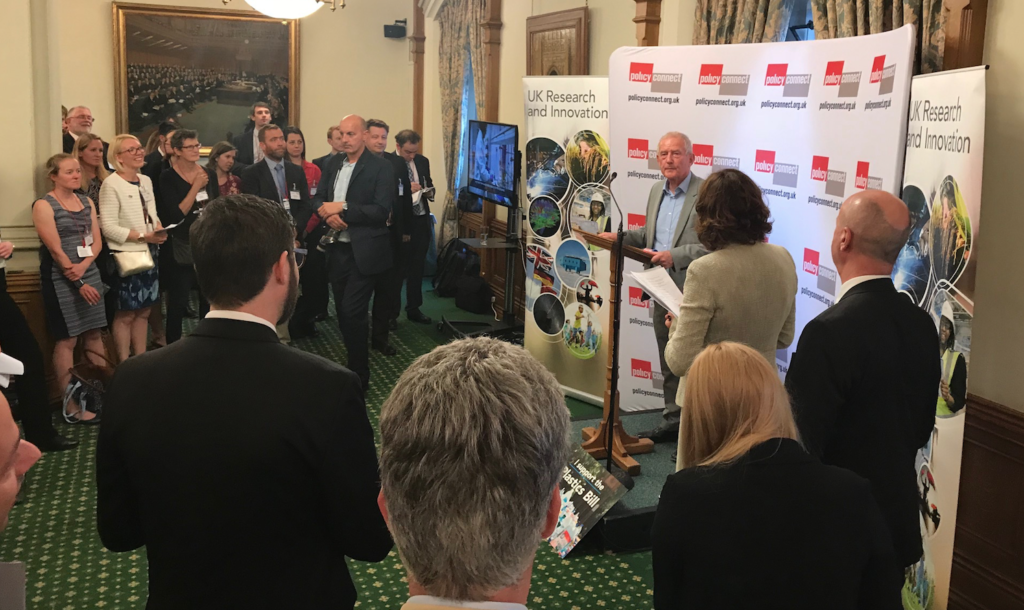Innovation key to achieving zero plastic waste recommends Made in the Midlands

Made in the Midlands has contributed to the growing debate on the best ways of achieving a national zero plastic waste strategy.
The organisation participated in an event held in the House of Commons organised by research body, UK Research and Innovation and cross-party think tank, Policy Connect.
UK Research and Innovation, which has a combined budget of more than £6 billion, brings together seven research councils from across the UK, together with Innovate UK and Research England.
Policy Connect brings together parliamentarians with public and private sector organisations to tackle big policy issues.
The two bodies are partnering on a project that aims to explore how best achieve the vision of ‘zero plastic waste’ and how the UK can become the global leader on the issue.
The event at Westminster was to launch the project and to stimulate debate amongst industry stakeholders on how this might best be achieved.
Chaired by science journalist and author Vivienne Parry OBE, the meeting outlined how the project will develop and by utilising research and industry knowledge will eventually provide a policy framework with a series of recommendations.
The opening discussion was attended by leaders from the plastics industry, environmentalists and academia.
The first speaker was Lord Deben, chairman of the Committee on Climate Change.
He said: “Let’s celebrate this meeting but we must also get the facts right as campaigners base their efforts on headlines, for example, bottles get headlines but they only make up 8% of total plastic waste.
“Let’s make it easy for people – do not use materials that can’t get recycled!”
Geraint Davies, Labour (Co-op) MP for Swansea West and a member of the Environmental Audit Committee, also spoke at the event. He has recently proposed a new plastics bill which aims to make plastic producers pay for recycling, have all plastic recyclable by 2025 and a plastic bottle levy alongside a refill scheme.
He told the meeting he claimed to have the support of at least 65 MPs for the bill.
“We need to move subsidies in favour of renewables,” he said.
Barry Sheerman, Labour (Co-op) MP for Huddersfield and co-chair of the All-Party Manufacturing Group – of which Made in the Midlands is a member, was another to speak.
He said, “We need to get angry, we need to have more passion and we have to get this passion into this business. What we need is good science, good legislation, and brave politicians.”
Andy Griffiths, from Nestle UK, who was speaking from consumer brand perspective, said: “We need to think beyond the norm, drive design and think about how we engage with the consumer. Plastic is a human problem and what we discovered in 2015 with the plastic bag charge is that charge works but a discount doesn’t.”
Speakers also discussed reframing the problem using clever science to transform plastics into higher value products and making waste into a business.
Jason Pitt, CEO, Made in the Midlands asked the panel what assurances companies involved in the plastics sector could expect from the strategy, especially when solutions to the problem did not entirely rely on the taxation of British companies and could simply displace the problem elsewhere and make UK businesses less competitive.
Panel members agreed that businesses in these sectors would need support and consideration before action was taken.
Jason said: “It is clear that the issue around plastics is not going away, with growing awareness and public support it is only a matter of time before single-use plastic is either banned completely or taxed so heavily that it will become uncompetitive.
“The advice Made in the Midlands has to people involved in this sector is to invest in innovation because there will be tremendous global opportunities for those companies able to provide innovative solutions to the plastic waste issue.”